MED News 01/2019
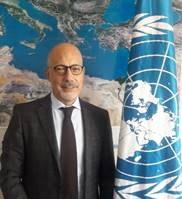 Editorial
Editorial
By Gaetano Leone, Coordinator, UNEP/MAP – Barcelona Convention Secretariat
The time is ripe for decisive action to accelerate the transition to sustainability in the Mediterranean. As we collectively prepare for the 21st Meeting of the Contracting Parties to the Barcelona Convention (COP21), let us to take a moment to reflect on what the Mediterranean Action Plan – Barcelona Convention system has accomplished thus far and on what we can do to turn the tide on environmental degradation. The Contracting Parties have built a comprehensive legal and institutional framework encompassing key building blocks for sustainability in the Mediterranean. The network of Regional Activity Centres is providing our community with the required scientific and technical expertise to move forward. What can we do more to ensure that these achievements can translate into a decisive shift to sustainability in the Mediterranean? At this stage, the answer to this question is two-fold: compliance with and full implementation of the Barcelona Convention and its Protocols. The Coordinating Unit of the UN Environment/MAP will continue to support Contracting Parties and Partners to make the much-needed progress on capacity-building and resource-mobilization in these areas. But let us remember that the Barcelona Convention is much more than a legal text: it epitomizes the essence of multilateralism and basin-wide solidarity that constitute our greatest strength.
15 July 2019
Air quality in the Mediterranean: Conclusions of the ECAMED study
Ineris and its partners, Citepa, Cerema and Plan Bleu, present the results of the ECAMED Study, whose objectives are to evaluate the cost and benefits for air quality of the implementation of an Emissions Control Area (ECA) in the Mediterranean Sea. ...
Ineris and its partners, Citepa, Cerema and Plan Bleu, present the results of the ECAMED Study, whose objectives are to evaluate the cost and benefits for air quality of the implementation of an Emissions Control Area (ECA) in the Mediterranean Sea. The conclusions show an interest for the implementation of such a measure and present the benefits for port cities. ECAMED has shown that the establishment of an ECA (or SECA / NECA), synonymous with reduction of sulfur oxide emissions (change to 0.1% sulfur content in fuels) and emissions of oxides of nitrogen (implementation of cleaner engines), would lead to health benefits at least three times higher than costs. More information...
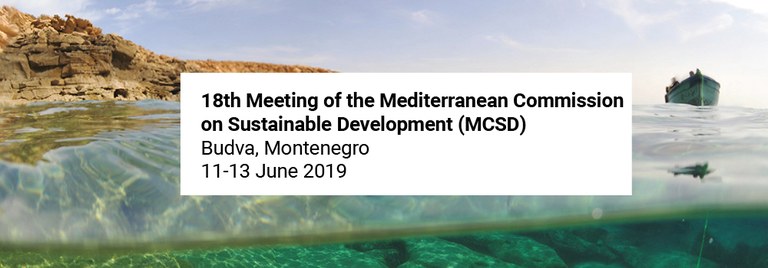
18th Meeting of the Mediterranean Commission on Sustainable Development (MCSD)
At the invitation of the Government of Montenegro, the MCSD will convene in Budva on 11-13 June 2019 with the participation of delegates of the 22 Contracting Parties to the Barcelona Convention and 18 representatives of 6 stakeholder groups, ...
At the invitation of the Government of Montenegro, the MCSD will convene in Budva on 11-13 June 2019 with the participation of delegates of the 22 Contracting Parties to the Barcelona Convention and 18 representatives of 6 stakeholder groups, including local authorities, socio-economic actors, civil society/NGOs, intergovernmental organisations, scientists and Parliamentarians.....Read more
International conference "Strengthening the Science-Practice-Policy interface in Blue Growth"
Plan Bleu co-organized with partners from the InnoBlueGrowth project an international conference entitled “Strengthening the Science-Practice-Policy interface in Blue Growth” in the Mediterranean region, which was held on 16-17th of April 2019 in ...
Plan Bleu co-organized with partners from the InnoBlueGrowth project an international conference entitled “Strengthening the Science-Practice-Policy interface in Blue Growth” in the Mediterranean region, which was held on 16-17th of April 2019 in Marseilles, France.
The InnoBlueGrowth project – or “Horizontal Communication & Capitalization project for Innovation in Blue Growth at Mediterranean level” (Interreg MED), led by the National Interuniversity Consortium for Marine Sciences (CoNISMa) and counting on the experiences of the Association of Mediterranean Chambers of Commerce and Industry (ASCAME), the Intermediterranean Commission of the Conference of Peripheral Maritime Regions (CPMR), Plan Bleu, the National Technical University of Athens (NTUA), and the University of Montenegro, aims at ensuring the communication and capitalization activities of thematic projects dealing with Blue Growth issues in order to increase their impacts towards common identified targets. Its activities are focused on the increase of the transnational activity of innovative clusters and networks of key sectors of the Mediterranean area.
This capitalization and community-building event highlighted the main deliverables of Blue Growth projects in terms of knowledge transfer from research to industry and to policy-makers.

REMPEC supports the Fourth Adriatic Oil Spill Conference (ADRIASPILLCON 2019)
REMPEC, the IMO-administered pollution emergency response centre in the Mediterranean, supported the 4th edition of the Adriatic Oil Spill Conference (ADRIASPILLCON 2019) held in Opatija, Croatia, between 28 and 30 May 2019, which was attended by ...

REMPEC, the IMO-administered pollution emergency response centre in the Mediterranean, supported the 4th edition of the Adriatic Oil Spill Conference (ADRIASPILLCON 2019) held in Opatija, Croatia, between 28 and 30 May 2019, which was attended by representatives from Eastern Europe, funded through IMO’s Integrated Technical Cooperation Programme (ITCP).
ADRIASPILLCON 2019 encouraged further discussions on the development of a sub regional oil spill contingency plan for the Adriatic Sea region, by providing a forum for States, regional and international institutions, oil, chemical and shipping industries, academic community, individual experts, specialised companies and equipment manufacturers to share their knowledge and experience.
The regional conference further focused on the level of preparedness of the region to respond to oil and chemical marine pollution, as well as mitigation of the risk and challenges of (future) offshore activities in the Adriatic Sea.
REMPEC shared its extensive experience and expertise in building capacity on oil spill preparedness and response in the wider Mediterranean region, including the support provided to other States, which contributed to the adoption of various other sub-regional contingency plans in the Mediterranean.
Further details concerning the ADRIASPILLCON 2019 can be found on the Conference website.
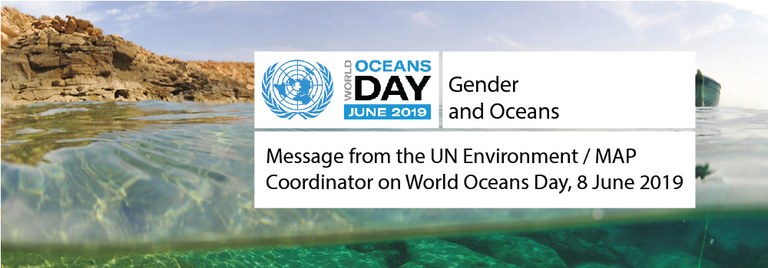
World Oceans Day, 8 June 2019
Message from the Coordinator of UN Environment/MAP, Gaetano Leone.
The UN Environment/Mediterranean Action Plan system will mark World Oceans Day, which aims at raising awareness about the crucial role that the oceans play in poverty eradication, global food security, human health, economic development and the ...
The UN Environment/Mediterranean Action Plan system will mark World Oceans Day, which aims at raising awareness about the crucial role that the oceans play in poverty eradication, global food security, human health, economic development and the global response to climate change.
Despite their importance, marine ecosystems are reeling under the pressure of unsustainable human activities that are ironically curtailing their ability to provide crucial services to the billions of people that depend on them. In certain contexts, women and girls are most vulnerable to marine ecosystem degradation due to pervasive gender inequalities.
By building on what we have achieved together over the last 40 years since MAP’s inception, we can decouple development from environmental degradation in the Mediterranean region and pursue blue growth that safeguards the ecosystem that sustains it. A major milestone was reached in 2011 when the Integrated Coastal Zone Management (ICZM) Protocol entered into force in the framework of the Barcelona Convention. Through this legally binding instrument, Contracting Parties committed to ensuring the sustainable management and use of coastal zones. We recently celebrated the ratification of the ICZM protocol by Lebanon and Malta. To date, 12 Contracting Parties have ratified the ICZM Protocol and we hope that the remaining Contracting Parties will soon follow suit.
“Gender and the Ocean”, the theme of this year’s edition of World Oceans Day, is an opportunity to explore the gender dimension of our relationship with the Mediterranean. Gender equality and the empowerment of women is at the heart of the 2030 Agenda for Sustainable Development and of the 2016-2025 Mediterranean Strategy for Sustainable Development. The progress in the implementation of these two frameworks for action will feature prominently on the agenda of the forthcoming meeting of the Mediterranean Commission on Sustainable Development, which will take place in Budva, Montenegro, on 11-13 June 2019. I invite participants in this important meeting to consider sustainability issues in the Mediterranean through the gender lens.
As one of the most advanced legal regimes worldwide for the protection of the marine and coastal environment, the UN Environment /MAP – Barcelona Convention system has an ambitious sustainable development dimension and is driving important initiatives contributing to the implementation of SDG 14 in the Mediterranean. Achieving SDG5 on gender equality means unlocking and harnessing the full human potential that our Mediterranean region offers to achieve SDG 14 and deliver inclusive blue growth for all.

Commitment on addressing marine litter and air pollution from ships gathers momentum
Both marine litter and air pollution from ships -- two issues on which the Regional Marine Pollution Emergency Response Centre for the Mediterranean Sea....Read more
Both marine litter and air pollution from ships -- two issues on which the Regional Marine Pollution Emergency Response Centre for the Mediterranean Sea....Read more
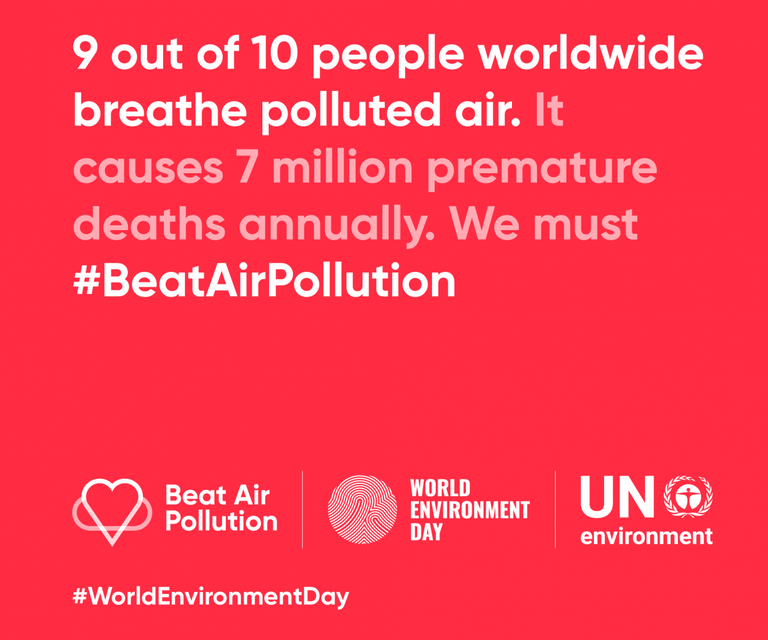
World Environment Day 2019: “Beat Air Pollution”
Holding our breath for a breakthrough in the Mediterranean
There is a widely held perception that land-based human activities are the only cause of air quality degradation. In the public’s perception, industrial plants and automobile exhaust pipes spewing black smoke are associated with air pollution, not ...
There is a widely held perception that land-based human activities are the only cause of air quality degradation. In the public’s perception, industrial plants and automobile exhaust pipes spewing black smoke are associated with air pollution, not ships. Yet, vessels carry today an estimated 80 per cent of all goods traded in the world. In 2017, the global maritime transport fleet grew by 3.15 per cent in terms of deadweight tonnage and by 2.47 per cent in terms of number of vessels (compared to 2016). Maritime transport is the backbone of international trade and an important source of pollution with adverse impacts on human health and ecosystems.
The Mediterranean Sea is host to the world’s busiest shipping lanes and is the second busiest cruising region in the world after the Caribbean with 15.8 per cent of global cruise fleet deployment in 2017 (MedCruise Association, 2018). Ship movements, which often occur close to the densely populated coasts of the Mediterranean countries, result in emissions of toxic gases and Particulate Matter (PM) from fuel combustion, including sulphur oxides (SOx).
SOx emissions contribute to the formation of sulphate (SO4) aerosols which, along with other types of PM, are able to penetrate deep into the lungs of humans and all living organisms. Exposure to such pollutants is linked to lung cancer, cardiovascular illnesses and asthma. Ecosystems suffer from the deposition of SO4 particles which increase acidification of surface water and soil. Sulphate also takes a toll on human-made buildings and infrastructure, including vulnerable world heritage sites. At certain concentrations in the air, SO4 increases haze and reduces visibility.
The UN Environment /Mediterranean Action Plan – Barcelona Convention system is working with the Contracting Parties on what could well become a sea change on air quality in the Mediterranean. We have been considering an adequate regime to cut ship emissions since the early 2000s, but we have never been closer to a breakthrough. This year’s Meeting of the Contracting Parties (COP 21) in Naples will examine, for the first time, the possibility of designating the Mediterranean Sea or parts thereof as an Emission Control Area (ECA) under Annex VI of the International Convention for the Prevention of Pollution from Ships (MARPOL).
Under MARPOL, countries bordering a specific sea basin can request the International Maritime Organization (IMO) to designate that sea as an Emission Control Area for sulphur oxides (SOx ECAs). So far, the Baltic and North Sea as well as the North American coasts have been designated as SOx ECAs by IMO. We hope that the Mediterranean Sea will be next.
On 1 January 2020, an IMO requirement will reduce the sulphur content permitted in ships fuel-oil globally from 3.5 per cent to 0.5 per cent, except in SOx ECAs where ships are required to use fuel with just 0.10 per cent sulphur. A feasibility study commissioned by REMPEC on behalf of the Contracting Parties to the Barcelona Convention recently established that the designation of the Mediterranean Sea area, as a SOx ECA (the proposed Med ECA) would lower emissions by 78.7 per cent for SOx and 23.7 per cent for PM2.5, when comparing to the expected emissions of the relevant pollutants in the scenario where only the IMO sulphur cap (0.5 per cent) is in place.
The incentives for taking bold action on curbing air pollution from ships in the Mediterranean are compelling. In addition to reducing lung cancer and cardiovascular disease mortality, air quality modelling used in the REMPEC study shows widespread reductions in wet and dry SOx and PM depositions with positive impacts on aquatic systems. The designation of the proposed Med ECA would increase aerosol optical depth, a physical phenomenon associated with reduced haze and improvements in visibility. Improvements in visibility would notably be felt over the Straits of Gibraltar, northern Morocco and Algeria, and along the main shipping lane connecting the Straits of Gibraltar to the Suez. They would also extend far inland over North Africa.
REMPEC submitted a draft road map as well as an initial draft submission to the IMO for review and consideration, to the 13th Meeting of its Focal Points to be held in Floriana, Malta, on 11-13 June 2019. The draft road map will then be considered by the 13th Meeting of the Focal Points of UN Environment/MAP prior to a potential adoption at COP 21 (Naples, Italy, 2-5 December 2019).
If this process comes to fruition, the submission of a joint and coordinated proposal to the IMO for the designation of the proposed Med ECA could be made in 2022, with a possible entry into force of the related amendment to MARPOL Annex VI some time after March 2024. With the ancillary benefits that it may carry for climate change mitigation efforts, the Med ECA would be a huge leap forward for the entire region and a significant accomplishment in the implementation of the 2030 Agenda for Sustainable Development.
There is hope in the air.
--------------
Useful resources:
Visit the World Environment Day (WED, 5 June) page and take part in the global #BeatAirPollution Campaign by using the WED 2019 practical guide.
Explore UN Environment’s work to improve air quality to protect the environment and human health
Read the IMO article Sulphur 2020 – cutting sulphur oxide emissions
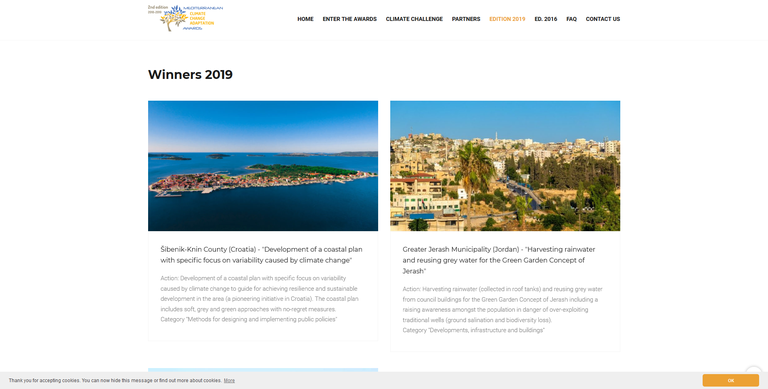
Mediterranean Climate Change Adaptation Awards 2018-2019
The French Environment and Energy Management Agency (ADEME), with the support of its Mediterranean partners: the Union for the Mediterranean (UPM), Plan Bleu and the Agency for sustainable Mediterranean cities and territories (AViTeM) has invited ...
The French Environment and Energy Management Agency (ADEME), with the support of its Mediterranean partners: the Union for the Mediterranean (UPM), Plan Bleu and the Agency for sustainable Mediterranean cities and territories (AViTeM) has invited with success all stakeholders from the Mediterranean territories to participate in the 2nd edition of the Climate Change Adaptation Awards in the Mediterranean. These awards was intended for climate change adaptation actors (local authorities, national agencies, public universities, NGOs and companies) in coastal, urban and rural areas around the Mediterranean. Award ceremony held on 29 May 2019 in Lisbon. More information…
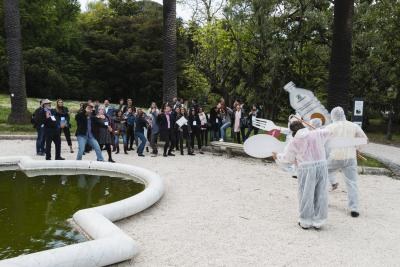
Capitalisation workshop of the MED Biodiversity Protection Community
The MED Biodiversity Protection Community organized a Community and Capitalisation event “Ecosystem based responses to Mediterranean biodiversity challenges” on the 6 and 7 May 2019 in Rome (Italy) gathering the 11 projects of the community. While ...
The MED Biodiversity Protection Community organized a Community and Capitalisation event “Ecosystem based responses to Mediterranean biodiversity challenges” on the 6 and 7 May 2019 in Rome (Italy) gathering the 11 projects of the community. While the previous event, held in Brussels, was transferring the lessons learnt by the community to policy stakeholders, this workshop focused on giving visibility to the tools developed by the community and the capitalisation tool of PANACeA, the « Mediterranean biodiversity knowledge platform ».
The Community Building event (6 May)
The Community Building event held on 6th May was an opportunity to build upon the results of the Biodiversity Community “Interactive Session” in Podgorica (May 2018) which had as tangible result the report "Tools for Ecosystem-based Management". The event consisted of a hands-on workshop on the latest tools developed by the Biodiversity Protection Community and the capitalisation tool of PANACeA, the « Mediterranean biodiversity knowledge platform ».
The objective was to share the latest developments and results from testing tools and to explore their transfer capacity to other actors. Participants also had the chance to agree on the approach to showcase the tools at key upcoming events as the PANACeA Final Event (October 2019) and the MedPAN MPA Forum 2020.
The Open Seminar (7 May)
Throughout the spectrum of cooperation and collaboration with the private sector, the Open Seminar that was held on the 7th May was a great opportunity to share best practices and in-depth knowledge on land sea interface and coastal risks, on a first session, and co-management and governance on a second session.
Local, regional and public agencies authorities from many Mediterranean countries had the opportunity to debate during constructive roundtables with Nongovernmental organizations, research institutes and cluster of private companies about ecosystem-based responses to Mediterranean biodiversity challenges.
The resulting report will be made available on the Interreg Med Biodiversity Protection website very shortly. In the meantime, you can already find a number of conference materials, the speakers' presentations and a selection of images in the Community website.
Have a look at the tweets produced during our events by #PANACeAevent2019 and #BiodiversityProtection and at the Photo Gallery !

SCP/RAC seeks best practices to reduce plastic footprint in the food and beverage sector
SCP/RAC calls for proposals to identify concrete business options and best practices to tackle plastic packaging in the F&B sector that can be replicated in Albania, Bosnia and Herzegovina and Montenegro. The list will be compiled into a guide or ...
SCP/RAC calls for proposals to identify concrete business options and best practices to tackle plastic packaging in the F&B sector that can be replicated in Albania, Bosnia and Herzegovina and Montenegro. The list will be compiled into a guide or set of guidelines in which each option will be analyzed, detailed and complemented by specific business examples and replicability options.
SCP/RAC, supported through the Cooperation Agreement between UN Environment and IMELS (Italian Ministry of Environment Land and Sea) and EBRD (European Bank for Construction and Development), is conducting a series of activities aiming at improving the policy framework and engaging with the food & beverage industry in Albania, Bosnia and Herzegovina and Montenegro for tackling plastics packaging value chains in a circular economy.
Interested applicants are invited to submit their bid by 3rd July midnight (CET) following the instruction laid down in the ToRs.
More...
Bureau of the Contracting Parties to the Barcelona Convention holds 88th session in Rome,Italy, 21-22 May 2019
The meeting was opened on 21 May 2019 in Rome (Italy) by Ms. Klodiana Marika (Albania), President of the Bureau. The Coordinator of UNEP/MAP—Barcelona Convention Secretariat presented progress reports on the activities carried out in the period from ...
The meeting was opened on 21 May 2019 in Rome (Italy) by Ms. Klodiana Marika (Albania), President of the Bureau. The Coordinator of UNEP/MAP—Barcelona Convention Secretariat presented progress reports on the activities carried out in the period from October 2018 to April 2019 and on the implementation of the decisions of the 20th Meeting of the Contracting Parties to the Barcelona Convention (COP20).
Bureau members examined preparations for COP21, notably the outcomes of the meetings of the Focal Points of the MAP Regional Activity Centres. The deliberations also addressed recent developments, including the recent ratification of ICZM Protocol by Malta; the finalization of the GEF MedProgramme Child Projects; the development of the 2020-2021 Programme of Work and Budget; and the need for strengthening the Secretariat in order to ensure the implementation of a new and ambitious Medium-Term Strategy from 2022.
The Bureau notably stressed the importance of a contribution by the MAP-Barcelona Convention to the post-2020 global biodiversity framework. Members also welcomed the process for a possible designation of the Mediterranean Sea or parts thereof as SOx emission control area under MARPOL Annex VI.
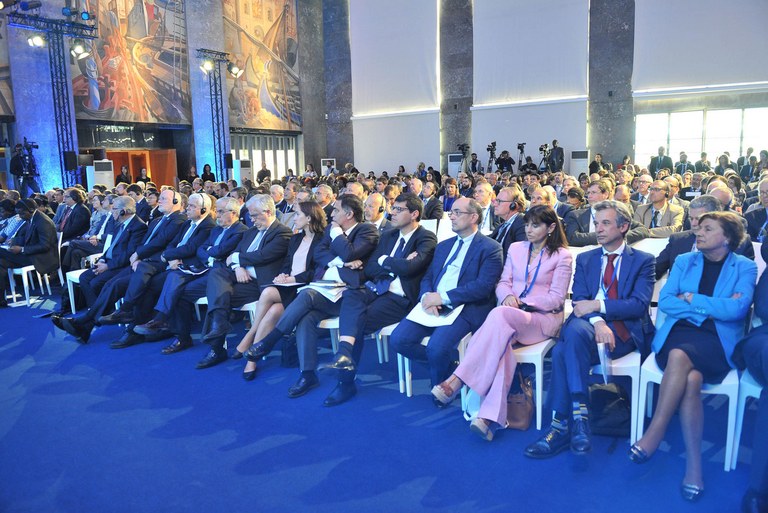
Presenting the Mediterranean perspective on Oceans Smart Governance (Lisbon, Portugal, 16-17 May 2019)
Coordinator Gaetano Leone represented the UNEP/MAP—Barcelona Convention Secretariat at the Ministerial Conference “Oceans Smart Governance – UN 2020: from Dialogue to Solutions” organized by the Ministry of the Sea of Portugal (Lisbon, Portugal, ...
Coordinator Gaetano Leone represented the UNEP/MAP—Barcelona Convention Secretariat at the Ministerial Conference “Oceans Smart Governance – UN 2020: from Dialogue to Solutions” organized by the Ministry of the Sea of Portugal (Lisbon, Portugal, 16-17 May 2019). The conference focused on knowledge sharing for the development of adequate governance solutions based on scientific evidence and innovation. Speaking on a panel dedicated to the theme of “Cooperation for practical solutions”, Mr. Leone underscored the importance of the regional dimension in addressing governance and knowledge issues. During the conference, the Secretary of State for the Environment of Spain notably cited the Barcelona Convention as a model and referred to the role of the UNEP Regional Seas Programme as an enabler of basin-wide data sharing.

12th SCP/RAC National Focal Points Meeting, 14-15 May 2019, Barcelona, Spain
The 12th National Focal Points Meeting of the Regional Activity Centre for Sustainable Consumption and Production (SCP/RAC) was held in Barcelona from the 14 to 15 May 2019 in order to review on SCP/RAC ‘s activities in compliance with the Programme ...
The 12th National Focal Points Meeting of the Regional Activity Centre for Sustainable Consumption and Production (SCP/RAC) was held in Barcelona from the 14 to 15 May 2019 in order to review on SCP/RAC ‘s activities in compliance with the Programme of Work 2017-2018 and to discuss and approve the SCP/RAC’s proposals for action in the next biennium 2020-2021, prior to its submission to the Meeting of the Focal Points of the Mediterranean Action Plan (10-13 September 2019) and to the 21st Ordinary Meeting of the Contracting Parties to the Barcelona Convention and its Protocols (2-5 December 2019) for adoption.
The SCP/RAC team was pleased to welcome the Contracting Parties of the Barcelona Convention to present the past and future activities of the centre.
You can get a glimpse of how the meeting went with a selection of key messages gathered in a curated slideshow: https://twitter.com/i/moments/1151081320090611712
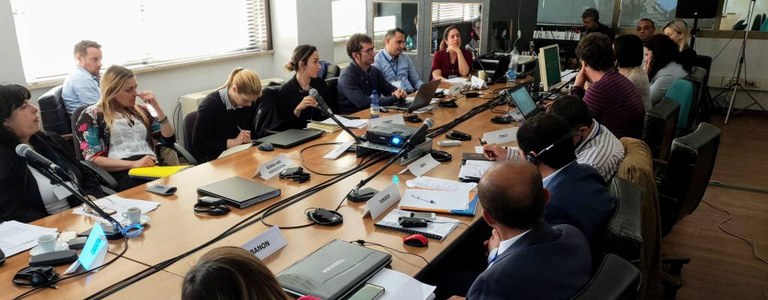
CORMON meeting on Coast and Hydrography held in Rome
On 21 and 22 May 2019, PAP/RAC organized a meeting of the Ecosystem Approach Correspondence Group on Monitoring (CORMON) on Coast and Hydrography cluster in Rome, Italy. The meeting was hosted by INFO/RAC at their premises. It was attended by ...
On 21 and 22 May 2019, PAP/RAC organized a meeting of the Ecosystem Approach Correspondence Group on Monitoring (CORMON) on Coast and Hydrography cluster in Rome, Italy. The meeting was hosted by INFO/RAC at their premises. It was attended by representatives of 15 Contracting Parties and PAP/RAC, Info/RAC, SPA/RAC and MEDPOL representatives, as well as by EcAp MED II project Coordinator.
One of the main topics of the meeting was to discuss and provide guidance on data standards and data dictionaries of the Coast and Hydrography indicators; to discus and agree on details related to Guidance Fact Sheets for these indicators; to exchange information on the status of implementation of IMAP at national level with regards to Coast and Hydrography, and to discuss and provide guidance on cross-cutting issues of regional importance for this Cluster. All the objectives were achieved and Conclusions and Recommendations adopted at the end of this productive meeting.

ICZM Protocol ratified by Malta
The Ministry of Foreign Affairs and Co-operation of Spain, in its capacity of Depositary of the Treaty for the Protection of the Marine Environment and the Mediterranean Seaside Region signed in Barcelona on 16 February 1976, informs that on 10 ...
The Ministry of Foreign Affairs and Co-operation of Spain, in its capacity of Depositary of the Treaty for the Protection of the Marine Environment and the Mediterranean Seaside Region signed in Barcelona on 16 February 1976, informs that on 10 April 2019, the Republic of Malta deposited the Ratification Instrument of the ICZM Protocol. The Protocol entered into force on 10 May 2019.
PAP/RAC welcomes this ratification raising hopes that it will contribute to the effective protection and sustainable management of this part of the Mediterranean coast. The ICZM Protocol ratification by Malta brings the number of ratifications to 12.
The collaboration of PAP/RAC with Malta has always been very good. We are convinced that the ratification of the ICZM Protocol will further strengthen our collaboration in the field of ICZM.
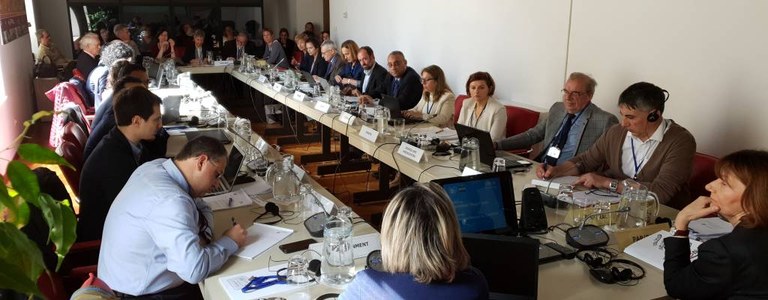
PAP/RAC Focal Points met in Split
On 8 and 9 May a meeting of PAP/RAC Focal Points was organised at PAP/RAC premises in Split. It was attended by representatives of 17 Contracting Parties, four invited experts, the UN Environment/MAP and INFO/RAC representatives, and PAP/RAC staff. ...
On 8 and 9 May a meeting of PAP/RAC Focal Points was organised at PAP/RAC premises in Split. It was attended by representatives of 17 Contracting Parties, four invited experts, the UN Environment/MAP and INFO/RAC representatives, and PAP/RAC staff. The main objectives of the meeting were to review and discuss the progress made in the implementation of the PAP/RAC Programme of Work during the 2018 - 2019 biennium, to report on the implementation of the Action Plan for the implementation of the ICZM Protocol 2012 – 2019, as well as to inform the participants on the process of preparation of the Common Regional Framework (CRF), the structure of the document and the Operational guidance for its implementation. The results of the complementarity analysis between SAP BIO and ICZM Protocol, as well as the draft Guidelines for Environmental Assessment in a Transboundary context were presented and discussed. In the end of the meeting, PAP/RAC Director presented the Programme of Work for the biennium 2020-2021. Following the constructive discussions, the Focal Points adopted the meeting conclusions and recommendations.
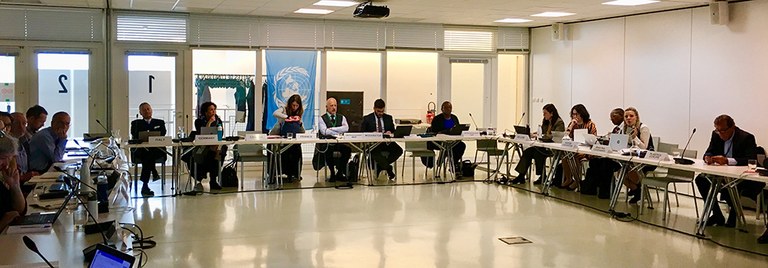
UN Environment/Mediterranean Action Plan at the G7 environment (Metz, France, 5-6 May 2019)
In the framework of this year’s G7 Ministers of Environment Meeting, UN Environment/Mediterranean Action Plan (MAP) in collaboration with the French Presidency and support by the...Read more
In the framework of this year’s G7 Ministers of Environment Meeting, UN Environment/Mediterranean Action Plan (MAP) in collaboration with the French Presidency and support by the...Read more
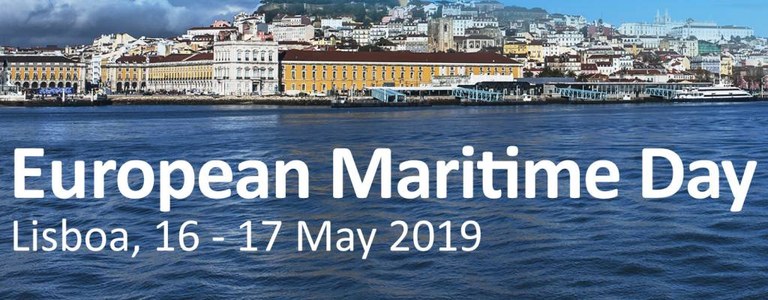
PAP/RAC at the European Maritime Day
PAP/RAC took part in the celebration of the European Maritime Day organized in Lisbon, Portugal, on 16-17 May 2019. Particular focus of PAP/RAC interest has been, among others, be on the session: Adaptation to 1.5C of global warming in ocean and ...
PAP/RAC took part in the celebration of the European Maritime Day organized in Lisbon, Portugal, on 16-17 May 2019. Particular focus of PAP/RAC interest has been, among others, be on the session: Adaptation to 1.5C of global warming in ocean and coasts: Urgent action. This session was an excellent opportunity for exchanging experiences, lessons learned, identifying successes, needs and challenges, while its main goal is producing short- and long-term recommendations to mainstream adaptation to impacts in ocean and coastal areas while seizing opportunities towards a climate resilient Blue Economy. PAP/RAC presented the ICZM Protocol in the Mediterranean as a tool for the regional adaptation, and the Coastal Plan for the Šibenik-Knin County, Croatia, as a local approach to adaptation and local application of the ICZM Protocol.
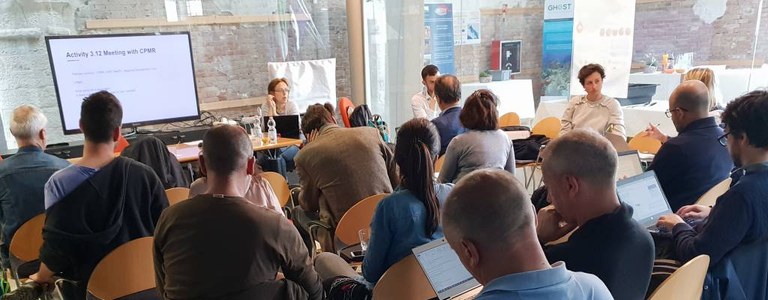
PHAROS4MPAs Steering Committee (Venice, Italy, 2-3 May 2019)
Partners of the PHAROS4MPAs gathered at the premises of CNR-ISMAR in Venice, Italy, on 2 – 3 May 2019 to exchange on the progress of the project’s action plan. First project products are now available, namely, four recommendation reports on maritime ...
Partners of the PHAROS4MPAs gathered at the premises of CNR-ISMAR in Venice, Italy, on 2 – 3 May 2019 to exchange on the progress of the project’s action plan. First project products are now available, namely, four recommendation reports on maritime sectors and MPAs dealing with maritime transport, aquaculture and offshore wind farms and cruise industry have been prepared and are ready, or almost ready, for publishing and widely disseminated. The preparation of these products was coordinated by PAP/RAC.
The partners have discussed the following actions: finalization of other recommendation reports ,i.e. on small-scale fisheries, scuba diving, tour boats, leisure boating; preparation of policy briefs, regional and national reports; development of the capitalization plan and stakeholder engagement plan; and readjustment of the project timeline taking into account the project’s extension plan.
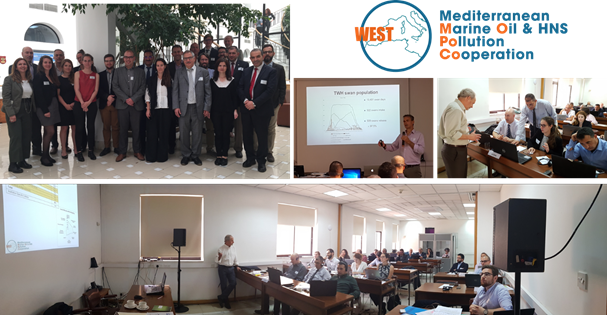
The Western Mediterranean coastal States used a harmonised self-assessment tool to evaluate their national contingency plan to respond to marine pollution
The Sub-regional Workshop on the use of RETOSTM was organised by the Regional Marine Pollution Emergency Response Centre for the Mediterranean Sea (REMPEC) (Valletta, Malta, 24-26 April 2019), in the framework of the Western Mediterranean Region ...
The Sub-regional Workshop on the use of RETOSTM was organised by the Regional Marine Pollution Emergency Response Centre for the Mediterranean Sea (REMPEC) (Valletta, Malta, 24-26 April 2019), in the framework of the Western Mediterranean Region Marine Oil and HNS Pollution Cooperation (West MOPoCo) project, co-financed by the European Commission's Humanitarian Aid and Civil Protection department (ECHO).
Eighteen (18) participants, Algeria, France, Italy, Malta, Morocco, Spain and Tunisia, representing national competent authorities in charge of the preparedness for and response to marine pollution from ships. In addition other members of the Project Consortium, amongst which including the Centre of Documentation, Research and Experimentation on Accidental Water Pollution (Cedre), the Istituto Superiore per la Protezione e la Ricerca Ambientale (ISPRA), and the International Tanker Owners Pollution Federation (ITOPF) participated to the workshop.
The Workshop allowed to achieve the first objectives of the Project:
(a) acquire hands-on working knowledge of the use of the “Oil Spill Response Planning and Readiness Assessment Manual” and its accompanying Excel™ tool (RETOSTM), to identify and analyse gaps in national oil preparedness and response programs; and
(b) apply a harmonised and clear approach, leading to high-quality assessment of national oil spill contingency plans, across the Western Mediterranean region.
The event also included technical support provided by Sea Alarm Foundation, which introduced its Self-assessment Tool for oiled wildlife preparedness. The agenda of this Workshop is available on the following link.
The participants acknowledged the practicality of the tool, which enables the identification of needs at national and sub-regional level, and recommended that such a workshop is organised in other areas of the Mediterranean region so as to extend a harmonised approach to the entire region.
With the technical assistance of the West MOPoCo Project, each beneficiary country will produce national self-assessment reports including gap analysis, performance analysis and an improvement programme of their respective national oil spill contingency planning.
The next step will be to organise a national event in each beneficiary country involving all national competent authorities so as to discuss the outcome of the assessment and to agree on the way forward to implement the improvement programme.
